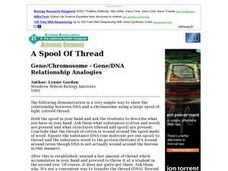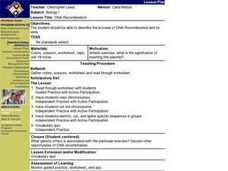Curated OER
Anticodons And Amino Acids Game
High schoolers examine the process of protein synthesis. In small groups, they select an index card, and translate the DNA to an amino acid, and define the words on an anticodon/amino acid chart.
Curated OER
Electrophoresis Analogy
Students participate in a simulation of electrophoresis separation of DNA fragments. They link arms to form DNA fragments with each student representing a nucleotide. As they move through an obstacle course they discover how fragments...
Curated OER
A Spool Of Thread
Students describe a spool of light colored thread that the teacher holds in his/her hands. They are asked what substances (cotton and wood) are present and what structures (thread and spool) are present. The teacher conclude that the...
Curated OER
Simulation of Gene Splicing
Learners simulate gene splicing by examining bacteria. They create a bacterial DNA into which they insert the human DNA (gene) that codes for growth hormone. They cut the sites of the enzyme to study how the human DNA can be joined to...
Curated OER
The Case of Regulation in Cells
After your biologists have learned about transcription, translation, and gene regulation, they work in a small group to create a poster of a system that serves as an analogy of the gene regulation process. They share their creations with...
Curated OER
Fingerprinting
Students discover the basics of fingerprinting and how it identifies a person. They create their own fingerprints and compare them to classmate's to determine that no two people have the same identity because of fingerprints. Then they...
Curated OER
Constructing a Protein Sentence
Fourth graders, in pairs, examine how every cell contains a 'blueprint' coded in DNA molecules. They use a DNA template to determine the m-RNA and t-RNA sequences for protein.
Curated OER
Secret Codes
Learners practice writing and decoding secret messages before discussing DNA and its role as a code for making proteins. They translate DNA into RNA and identify the sequence of amino acids to find a secret message. An interactive...
Curated OER
Using VNTR Analysis to Identify Guilt at a Crime Scene
Students collect DNA from cheek cells. They compare and contrast the processes of DNA replication and PCR. They discuss how this information can be used to determine guilt at crime scenes.
Curated OER
Gene Action and Mutation
Students review terms related to DNA structure and function. They complete a variety of worksheets in small groups or in pairs reflecting the unit's concepts regarding DNA. They submit their worksheets for grading.
Curated OER
"Who Done It?" Analysis of Molecular Fingerprints Left At the Scene of the Crime
Learners examine different types of DNA fragments. They record and analyze their results. They determine who is the criminal in the story.
Curated OER
Gene Regulation Mechanisms
Students explore genetics. They discuss how chromosomes and/or genes are regulated during the life of an organism. In a lab setting, students compare and contrast the genomic regulation of prokaryotic and eukaryotic cells using...
Curated OER
Molecular Evidence for Evolutionary Relationships
Learners compare the amino acid sequences in cytochrome-c for a variety of organisms and use this information to infer evolutionary relationships. Students investigate the role of homeobox genes and what this indicates about the...
Curated OER
Cutt-Off Genes
Students explore how gene sequence analysis can be used to examine phylogenetic similarities of different organisms. Students work in groups to simulate a gel electrophoresis separation of fragments using poster board to create their gel.
Curated OER
DNA and Genes
Students analyze the structure of DNA. They describe how the structure of DNA enables it to reproduce itself accurately. Students discuss genes and the sequence of nucleotides occur in DNA.
Curated OER
Sequencing the Cystic Fibrosis Gene: A Simulation
Ninth graders determine nucleotide sequences. They identify those base sequences that are normal, those that are normal variants and those that cause cystic fibrosis. Students use DNA nucleotide sequences to determine amino acid...
Curated OER
DNA Recombination
Students describe the process of DNA Recombination and its uses. They are asked what genetic effect is associated with the exercise? Students discuss other opportunities of DNA recombination. They are given a worksheet, and students...
University of Colorado
Punnett Squares with Piebald Deer
Explore the science behind Earth's amazing diversity of life with this instructional activity on genetics. Looking at specific traits in piebald deer, carnations, and roan cattle, young scientists use Punnett...
Curated OER
Recovering the Romanovs
Students use DNA to solve an identity mystery. In this biology lesson, students use the Internet to gather information about sex-linked disorders and complete a Punnett square for hemophilia, then examine a handwriting analysis, ear...
Curated OER
Ghost in Your Genes
Students explore DNA microarrays. In this genetics lesson, students model DNA microarrays that are used by scientists. Students work to determine levels of breast cancer genes in patients. They will determine the treatment required based...
Curated OER
Embryology as Evidence of Evolution
Students observe the two major developmental pathways (protostome and deuterostome). They analyze data regarding differences in nucleotide sequences and construct a phylogenetic tree. They observe the similar evolutionary history shared...
Curated OER
Pliable Proteins
Students make models of protiens using wire and paperclips. They are given step by step instructions with lots of information about proteins throughout the directions. They make the three basic structual elements of proteins;...
Curated OER
Island Biogeography and Evolution: Solving a Phylogenetic Puzzle With Molecular Genetics
Students engage in solving a logic problem based on real organisms and real data. They develop phylogenies for seven related populations of lizards living on the Canary Islands.
Curated OER
Simulation of Gene Splicing
Students use the exercise as a prelude to a "wet" lab or as a substitute for such a lab. It correlates well with colony transformation labs. This lab is recommended for students what have difficulty with the abstractions that genetic...























